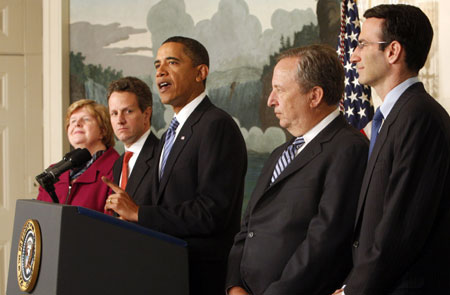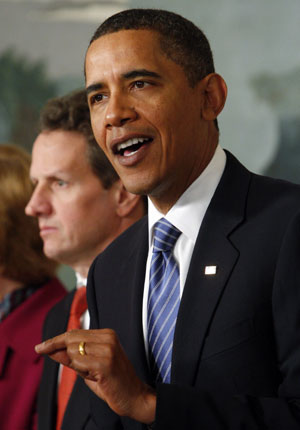Obama proposes fee on major financial firms
US President Barack Obama on Thursday proposed that major financial firms in the United States pay a new fee to help government recover losses on a financial crisis bailout fund.
 |
|
U.S. President Barack Obama (C) makes remarks urging Wall Street to roll back executive bonuses as he proposed a fee to repay taxpayers for a financial bailout at the White House in Washington, January 14, 2010. Obama is joined by (L-R) Chair of the Council of Economic Advisers Christina Romer, Treasury Secretary Timothy Geithner, National Economic Council Director Larry Summers and OMB Director Peter Orszag.[Xinhua] |
The tax on banks, insurance companies and brokerages with more than 50 billion dollars in assets, would start after June 30 and raise 90 billion dollars over the next 10 years.
The Obama administration, which will send the bill to Congress in early February, expects that 60 percent of the revenue would come from the 10 largest firms.
In a televised speech, Obama said that he was determined that every dollar spent from the 700 billion dollar Troubled Asset Relief Program to rescue Wall Street firms, auto companies and mortgage holders is either repaid or paid for in some fashion.
"My determination to achieve this goal is only heightened when I see reports of massive profits and obscene bonuses at the very firms who owe their continued existence to the American people," Obama said at the White House.
"We want our money back! And we're going to get it," said the president, surrounding by member of his economic team.
"My commitment is to recover every single dime the American people are owed," Obama stressed, adding that the desire is heightened by reports of new big bonuses for bank executives.
"That's why I'm proposing a financial crisis responsibility fee to be imposed on major financial firms until the American people are fully compensated for the extraordinary assistance they provided to Wall Street," he stated.
 |
|
U.S. President Barack Obama (R) makes remarks urging Wall Street to roll back executive bonuses as he proposed a fee to repay taxpayers for a financial bailout as Treasury Secretary Timothy Geithner listens at the White House in Washington, January 14, 2010.[Xinhua] |
According to Obama administration, the 700 billion dollar financial bailout program will end up costing U.S. taxpayers around 117 billion dollars.
"Obviously, a lot less than the 700 billion dollars that people have feared, but still a lot of money," said Obama.
In his remarks, Obama said if these companies are in good enough shape to afford massive bonuses, they are surely in good enough shape to afford paying back every penny to taxpayers.
However, the Financial Services Roundtable, which represents 100 top financial services firms, voiced strong rejection to the proposal.
"Two-thirds of the TARP investment from banks has already been repaid with a large profit to the taxpayer," said the Roundtable's president and chief executive Steve Bartlett.
"This proposed tax will do nothing more than stifle economic recovery and encumber more pressing concerns, such as covering new regulatory costs."
The U.S. Chamber of Commerce also sent a letter to the Obama administration, saying the proposed fee would have unintended consequences that "may cost the government more than it hopes to raise."
"While the Chamber agrees that TARP funds should be recouped and excessive risk curbed, we are extremely concerned about a proposed bank tax because it may restrict the liquidity needed by small business to fuel job creation and economic growth," said the Chamber's letter.
 0
0 







Go to Forum >>0 Comments